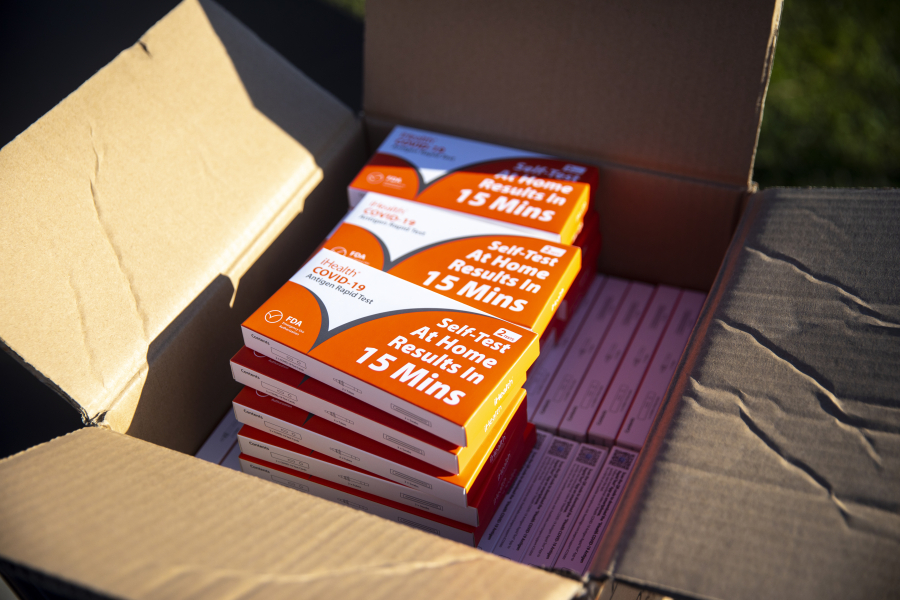If 2022 was the year of free COVID-19 test kits for many California seniors, 2023 is shaping up to be the year of fraudulent COVID-19 test kits.
Consider what happened to Judy, an 85-year-old Medicare recipient in Southern California (we’re withholding her last name because she’s concerned about being victimized further). One day this year, five COVID-19 test kits showed up at her home without her ever requesting them.
“I didn’t pay any attention to the unsolicited COVID tests, so I threw them out,” Judy said. “It wasn’t until some months later that I received my Medicare summary bill and I saw charges for over-the-counter COVID tests I didn’t order.”
Each kit cost $120 to $150 — and she was responsible for a portion of the bill.
Judy is just one of hundreds of people who have fallen victim to a new scam involving COVID-19 test kits, part of the rising trend of fraudulent activity since the start of the pandemic.
Here’s how it works: Scammers buy stolen Medicare numbers online or extract them directly from Medicare patients. They use these ID numbers to bill Medicare for over-the-counter test kits, collecting a tidy profit on each one and causing enrollees to receive kits they did not order.
The U.S. Department of Health and Human Services’ Office of Inspector General has received numerous complaints from around the country about this scam, said Scott Lampert, assistant inspector general for investigations at the Department of Human Services.
“We’re doing what we can to investigate them thoroughly and hold the criminals that are pursuing these schemes accountable,” Lampert said.
Lampert declined to reveal how many complaints the Office of Inspector General has received, the details of the investigations and how the office is holding criminals accountable. According to a news release updated in June, fraudulently ordered COVID-19 testing kits have cost Medicare more than $203 million.
The Justice Department in April accused a Florida physician and a marketer of illegally buying Medicare ID numbers and sending tests to seniors who did not request them. The scheme led to $8.4 million in fraudulent Medicare claims, the Justice Department said.
Some seniors were sent unsolicited tests only once, but others have been receiving them on a monthly basis, said Amy Nofziger, director of victim support for AARP’s Fraud Watch Network. Nofziger pointed out that certain states with higher populations of older adults, such as Florida, Arizona and New York, have become targets for criminals to exploit.
What happened to free COVID-19 home tests?
In January 2022, the Biden administration offered all households a limited number of rapid COVID tests for free, increasing access to testing as part of its effort to combat COVID-19. A few months later, in April 2022, the Centers for Medicare & Medicaid Services decided to pay for eight tests per month for those with Medicare Part B coverage.
Both offers ended on May 11, 2023, but Medicare still covers the cost of coronavirus lab tests ordered by a healthcare provider.
What tips should be kept in mind to help prevent fraud?
- Be cautious about unsolicited requests for your personal, medical and financial information. Medicare will not call enrollees to offer products, services or benefit reviews in exchange for your Medicare number.
- Be skeptical about any COVID-19 testing site or testing-related solicitation that demands your financial or medical information in order to receive a free test.
- Regularly check your quarterly Medicare Summary Notices, which list what Medicare is being billed for, to ensure that you recognize all of the charges to your account.
- Beware of anyone offering to sell you at-home COVID-19 test kits in exchange for your personal or medical information. Ensure your safety by purchasing FDA-approved COVID-19 test kits only from legitimate providers.
What do I do if an unsolicited test kit is sent to my home?
- Dispose of test kits to avoid any potential risks, but make sure to jot down any information on the package, such as the lot number, sender address and expiration date.
- Contact either Medicare at (800) 633-4227 or your Medicare provider to request a new Medicare beneficiary card with a new member number. The card will be mailed within two weeks. If possible, don’t use your old member number until you receive the new card.
- Submit a complaint about the fraud to the Office of Inspector General hotline or by calling (800) HHS-TIPS ([800] 447-8477).
- File a report with the Federal Trade Commission. This helps authorities investigate and prevent further fraudulent actions.
- If you have concerns about COVID-19 testing or your health, consult with healthcare professionals, such as your primary care physician or local health department, who can provide accurate information and guidance.



